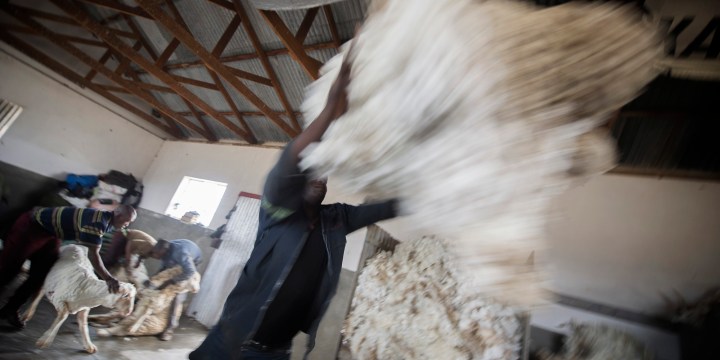AGRICULTURE AND TRADE
SA welcomes China’s decision to lift wool products ban sparked by foot-and-mouth disease outbreak

China’s decision to lift the ban on ‘greasy wool’ from South Africa, imposed because of the foot-and-mouth disease outbreak, has been widely welcomed. But serious questions are being asked about the government’s handling of the outbreak.
The decision on Tuesday by the People’s Republic of China to lift restrictions on South African wool products imposed because of the foot-and-mouth disease (FMD) outbreak was welcomed by the industry as well as by Agriculture Minister Thoko Didiza and Trade Minister Ebrahim Patel.
According to the Department of Agriculture, Land Reform and Rural Development (DALRRD), South Africa produces more than 42 million kilograms of wool from 8,000 commercial sheep farmers. In addition, there are 40,000 communal smallholder farmers who contribute 14% of the total wool exports.
“These farmers would have suffered an irrecoverable loss of R730-million if the restrictions had continued. The wool export industry is worth R1-billion.
“This ban on wool, which was harvested in the last season, would have irrecoverably dented the wool industry since this year’s harvesting is in full swing. This means the industry would have had to incur losses of two seasons,” said the department.
Didiza said they welcomed the decision by the General Administration of Customs of China (Gacc) and the Ministry of Agriculture and Rural Affairs of China to lift the import ban on wool and other cloven-hoofed animal products.
Patel said the engagements with China had been conducted in a positive manner and that the coordinated efforts by different sections of the SA government had assisted greatly.
Cape Wools South Africa (CWSA) said in a statement that the lifting of the ban on the import of “greasy wool” from South Africa was a huge relief.
“This has been verbally conveyed to us through the DALRRD and the announcement has been posted on the official Gacc website. We are equally relieved that it has been lifted without the imposition of any additional conditions. This means the health certificate we have been using since 2019 is unchanged,” read the statement.
The CWSA said that after months of negotiations, Cape Wools wanted to extend its “sincere appreciation” to the DALRRD, Dirco, the dti and the ministers of both the DALRRD and Trade and Industry for their support and assistance.
“The ban was an unexpected development in April and has been a cause for deep concern. We are very grateful to be able to put this behind us and look forward to business as usual,” said the CWSA.
On 16 August, Didiza announced a 21-day ban on all movement of cattle across the country after 116 cases of FMD were diagnosed in six provinces, which affected farms, feedlots and communal areas.
The affected provinces are Gauteng, Limpopo, Free State, North West, Mpumalanga and KwaZulu-Natal.
Two days later, on 18 August, Didiza published the restrictions in the Government Gazette under the Animal Diseases Act, restricting the movement of cattle nationally for 21 days, except under a red cross permit for slaughter at a registered abattoir, with the aim of preventing the spreading of FMD virus through the movement of live cattle between different properties.
The ban by the minister was not well received by Agri Eastern Cape president Peter Cloete, who said imposing a restriction on the movement of cattle countrywide for 21 days was a knee-jerk and irrational measure taken by a minister who needed to be seen to be doing something.
Visit Daily Maverick’s home page for more news, analysis and investigations
“The reality is that Government Veterinary Services have failed dismally in getting the latest foot-and-mouth spread under control. Currently, the Eastern Cape, Northern Cape and Western Cape have no reported cases of FMD. Agri Eastern Cape requested months ago that control measures be put in place at the provincial borders to prevent the spread, while outbreaks within other affected areas were focused on,” he said.
Cloete said the request resulted in a directive being issued by Dr Vusi Rozani, acting chief director of Veterinary Services, on 2 August. The directive stipulated that any animal being moved into the Eastern Cape should be done so under a movement permit issued by a state veterinarian.
This directive, which was not enforced by means of roadblocks at provincial entry points – apparently due to costs – was welcomed, as it would have allowed economic activity in the province to continue, while limiting the risk of the disease spreading. However, this directive was withdrawn on 15 August to make way for the National Control Measure.
Cloete said it was clear that those who advised the minister on this matter have no concept of the realities on the ground.
“Failing to contain FMD within the infected zones and having outbreaks within the previously FMD-free zones by means of movement bans, it cannot be understood how extending these movement restrictions for 21 days to the whole country will assist,” Cloete said.
He said unless physical movement control points were set up, all that was going to happen was that law-abiding producers, who were not the problem, would probably adhere to the control measures, while those producers, speculators and agents who were the problem would simply continue movement without sanction.
“Meat prices to the consumers … are going to rise and normal market forces will be disrupted and most certainly taken advantage of by some within the industry. In its current form, the national ban will only aid in the continued destruction of the economy and severely impact the smaller role players within the value chain,” said Cloete.
He said the processes that allowed moving animals for slaughter under a red cross permit were impractical, costly and could not be effectively complied with, given the limited number of private and state veterinarians.
“These measures are going to have an impact on animal welfare, such as emergency slaughters, the essential transport of dairy animals from run-off farms to milking farms, and the transport of dairy calves to growing-out facilities.
“In spite of the implementation of biosecurity measures at auction facilities, sales cannot go ahead, even with the veterinary screening of animals. This is a devastating blow for producers and emerging farmers.
“Agri Eastern Cape has been calling on government and industry role players for a number of years to effectively police the infected zones and implement a compulsory national animal traceability system. One can only question the motives behind the reasons why this has not happened,” he said.
Cloete said it was also not understood why formal, recognised structures such as Agri Eastern Cape, the EC Animal Health Forum and the provincial Red Meat Producers’ Organisation had not been consulted for input before such a drastic measure affecting the Eastern Cape was taken.
“Agri Eastern Cape is calling on the minister to rescind this irrational [ban] and rather impose restrictions, enforce interprovincial movement control and focus attention in the affected areas.
“More importantly, government needs to start consulting urgently with all industry role players on meaningful, implementable and practical measures to get FMD under control,” he said. OBP/DM






















 Become an Insider
Become an Insider
Comments - Please login in order to comment.